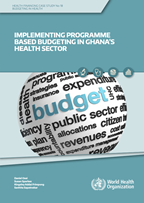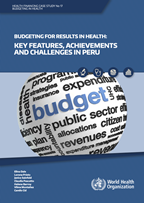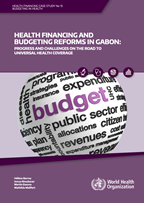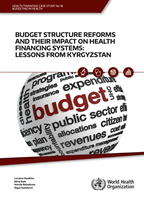Programme budgets in health – Country evidence
Overview
Historically, health budgets in most low-and-middle income countries (LMICs) have been structured by economic classification, which typically details inputs by line-items for personnel, goods, services, and infrastructure. Over the past two decades, countries have initiated budget formulation reforms to shift towards budgets that are formulated around programme goals and outputs. While input-based budgets may create rigidities in resource use and do not allow the linking of resources to outputs, programme budgets have the potential to support better alignment with health sector policies and strategies, provide more flexibility in fund management, and facilitate stronger transparency and accountability towards health outputs. However, this transformation is not automatic. The reform has often led to hybrid formulation and mixed results in terms of flexibility and accountability in LMICs.
To support Member States in their budgetary reforms, WHO has initiated a programme of work to generate evidence, identify good practices, and provide guidance on how best to formulate, implement, and monitor programme budgets in the health sector. As part of this programme of work, WHO conducted in-depth reform assessments between 2017 and 2021 in countries of various WHO regions that have introduced programme budgets. Armenia, Burkina Faso, Gabon, Ghana, Kyrgyzstan, Peru, and Uganda were part of this exercise to understand more about reform process and outputs in health. Our partners in this work, International Budget Partnership and the OECD, conducted further studies, respectively in Brazil, Indonesia, Mexico, the Philippines, and in Chile, Latvia, and New Zealand.
The case study reports presented below followed a common analytical framework. They analysed the process and outputs of the reform in the health sector, looking at how programme budgets were introduced and their impact on health spending. The reviews further identified key bottlenecks in the transition to programme budgets and provided policy recommendations to guide budgetary and health authorities in future reform adjustments. Moving forward, the country reviews were used to develop general guidance on how to tailor budget formulation reforms to sector needs. The forthcoming WHO guidance book Making budgets work for health: a practical guide for designing, managing and monitoring programme budgets in the health sector builds on the country evidence generated by WHO and partners.
The programme of work receives financial support from GAVI.
Publications

Transition to programme budgeting in Uganda: status of the reform and preliminary lessons for health
Many countries have initiated transitions to programme-based budgeting (PBB) to better align budgets to public policy priorities and to enhance accountability...

Much like overall health financing, Ghana’s budgeting process has undergone a lot of changes in recent years. First in 1998, Ghana’s budget...

There is no universal health coverage (UHC) without public financing, making public budgeting a central piece of UHC reforms. Peru has made significant...

Health financing and budgeting reforms in Gabon: Progress and challenges on the road to universal health...
Despite significant efforts, health financing reforms in Gabon have not been fully implemented. Public funding as a share of total health expenditure increased...

Budget structure reforms and their impact on health financing systems: lessons from Kyrgyzstan
Since its independence, Kyrgyzstan has shown commitment to the goals of the universal health coverage. It has led to documented improvement in financial...
Transition to programme budgeting in health in Burkina Faso: status of the reform and preliminary lessons...
Public funds are essential for making progress towards universal health coverage (UHC). No country has made significant progress towards UHC without relying...
Budget structure in health and transition to programme budgeting: lessons from Armenia
Public funds are essential for making progress towards universal health coverage (UHC). No country has made significant progress towards UHC without relying...
Related Links
Related health topics
